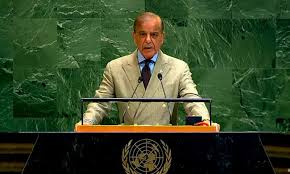The annual United Nations General Assembly (UNGA) has once again become a stage for sharp exchanges between India and Pakistan. This time, New Delhi strongly rebuked Pakistan Prime Minister Shehbaz Sharif’s speech, in which he raised the Kashmir issue and accused India of “Hindutva-driven extremism.” India hit back forcefully, dismissing his remarks as baseless propaganda and reaffirming that Jammu and Kashmir is an integral part of India.
What Did Shehbaz Sharif Say?
Addressing the UNGA, PM Shehbaz Sharif repeated familiar Pakistani talking points:
-
He alleged that India’s policies in Jammu and Kashmir were oppressive and violated human rights.
-
Sharif accused New Delhi of promoting “Hindutva-driven extremism” and claimed that minorities in India were under threat.
-
He urged the UN and global community to intervene, portraying Kashmir as the “core dispute” between the two countries.
-
Sharif also linked regional peace to a resolution of the Kashmir issue, attempting to cast Pakistan as a victim of India’s policies.
His speech was in line with Islamabad’s long-standing strategy of internationalizing Kashmir, particularly at global forums like the UN.
India’s Strong Response
India’s delegation at the UN wasted no time in tearing into Sharif’s remarks. In a sharp rebuttal delivered through the “Right of Reply” mechanism, Indian officials made three key points:
-
Baseless Allegations: India described the speech as factually incorrect and motivated by Pakistan’s obsession with Kashmir.
-
Pakistan’s Record: New Delhi reminded the global community of Pakistan’s own track record—harboring terrorism, persecuting minorities, and suppressing democratic voices.
-
No Role for Outsiders: India reiterated its consistent position that Jammu and Kashmir is an internal matter, and Pakistan has no locus standi to interfere.
The Broader Context
This exchange is part of a familiar pattern at the UNGA. For decades, Pakistani leaders have used their speeches to spotlight Kashmir, often accompanied by accusations against India. India, in turn, responds by highlighting Pakistan’s role as a sponsor of terrorism and its poor human rights record, particularly in regions like Balochistan.
What is new this year is Sharif’s framing of his remarks around “Hindutva-driven extremism.” This appears to be an attempt to tap into global anxieties about religious nationalism, hoping to gain traction with international audiences. However, India countered that such remarks were hypocritical, given Pakistan’s own systemic religious intolerance.
Why It Matters
These exchanges may appear routine, but they serve important purposes:
-
For Pakistan: Keeping Kashmir alive on the international stage is central to its foreign policy narrative.
-
For India: Strong rebuttals reinforce sovereignty, project confidence, and prevent Pakistan’s claims from gaining legitimacy.
-
For the UN: Such debates highlight how the India-Pakistan rivalry continues to echo in global forums, even as the world body struggles with larger issues.
Conclusion
Prime Minister Shehbaz Sharif’s UN speech, centered on allegations of “Hindutva-driven extremism” and Kashmir, drew a swift and sharp response from India. By calling out Pakistan’s double standards and reiterating that Jammu and Kashmir is an inseparable part of India, New Delhi signaled that it will not allow Islamabad’s rhetoric to go unanswered.
As the dust settles on this year’s UNGA, one thing is clear: the India-Pakistan narrative remains unchanged—Kashmir continues to be Pakistan’s rallying cry abroad, and India continues to firmly reject any interference.



